Het kwam toch als een schok, het verdrietige bericht dat cabaretier, presentator en theatermaker Marc de Hond gisteren is overleden. Rond het begin van corona hadden we nog even contact over zijn theatertournee Voortschrijdend inzicht, die hij maakte als nalatenschap voor zijn kinderen. Hoe jammer was het dat de meeste voorstellingen nu voor onbepaalde tijd moesten worden uitgesteld. Zijn gezondheidssituatie leek eerder dit jaar nog redelijk stabiel. Hoe snel is het ineens gegaan met zijn ziekte, die Marc nu heeft weggenomen van zijn dierbaren.
Het interview dat we recent maakten, waarin hij nog optimistisch en hoopvol was over de toekomst, blijkt nu ineens een van de laatste grote interviews te zijn geweest. Het was een even ontroerend en nuchter gesprek over verlies en afscheid nemen, kansen benutten en het leven ten volle omarmen, hoe kort of lang het ook duurt. ‘Ik moet het echt nog een paar jaar volhouden, anders zal mijn zoontje James me nooit hebben gekend,’ zei hij. Het heeft helaas niet zo mogen zijn. Ter nagedachtenis aan een bijzonder mens.
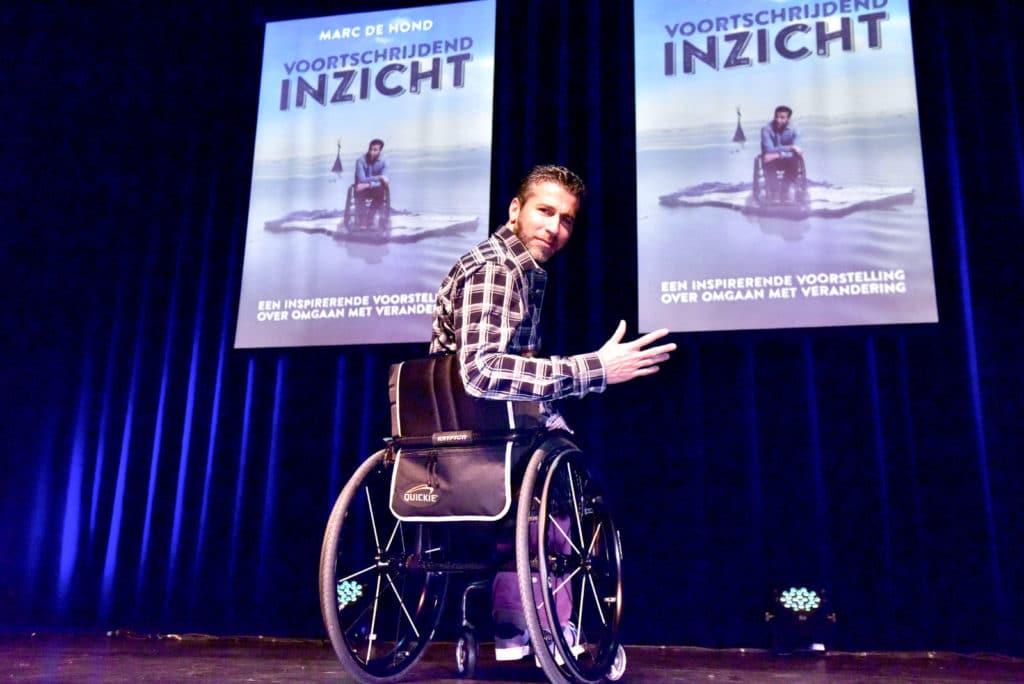
Een kind wil zijn ouders kennen
‘De afgelopen maanden heb ik veel gehuild als ik mijn zoontje James naar bed bracht. Terwijl hij lag te slapen, beloofde ik hem er alles aan te doen om te blijven leven. Ik moet het echt nog een paar jaar volhouden, anders zal hij me nooit hebben gekend.
Eind 2018 werd bij mij blaaskanker ontdekt. James was nog een baby, mijn dochter Livia was bijna 2 – even oud als mijn broertje en ik waren toen mijn moeder Jasmin borstkanker kreeg. Inmiddels is Livia 3 – de leeftijd waarop ik zelf mijn moeder verloor.
Na haar dood kreeg ik al snel een heel lieve stiefmoeder. Caroline was al sinds mijn geboorte mijn oppas. Ik beschouw haar ook echt als mijn moeder. Maar hoe lief ze ook was, mijn echte moeder kon ze natuurlijk niet volledig vervangen. Al komt er nog zoveel liefde van iemand anders voor in de plaats, als je op jonge leeftijd een ouder verliest, ervaar je een gevoel van gemis; je blijft je altijd afvragen hoe het zou zijn als diegene er nog wel was geweest.
Mijn moeder liet voor mijn broer en mij een casettebandje achter met een geluidsopname van een avond samen en een boodschap voor ons: ze hoopte dat we goede Joodse jongens zouden worden. Ik luister dat bandje niet zo vaak, want het raakt me nog steeds heel diep. Maar ik ben zó blij dat het er is – anders had ik haar stem nooit gekend. Het maakt haar op een bepaalde manier onsterfelijk.
Ik wil mijn kinderen ook iets substantieels nalaten. Om die reden heb ik Voortschrijdend inzicht, de theatertournee die ik eerder moest afzeggen vanwege de behandelingen, een andere draai gegeven. In de nieuwe voorstelling word ik geïnterviewd over mijn leven door steeds een andere interviewer, zoals Eva Jinek, Humberto Tan en Paul de Leeuw. Zij zullen mij vanuit hun eigen perspectief dingen vragen die Livia en James later misschien van me willen weten als ik er niet meer ben. Al die interviews worden gefilmd.
Misschien denken mijn kinderen straks wel: urenlang naar mijn vader gaan zitten kijken? Ja, dáág. Misschien komt er een moment dat ze er behoefte aan hebben, en kijken ze één of twee interviews, of wie weet wel allemaal. Ik laat hen liever te veel na dan te weinig, zodat zij echt de kans krijgen mij te leren kennen. Maar het gemis en verdriet dat ze, mocht het misgaan, zullen voelen, zal ik er niet mee kunnen wegnemen.’
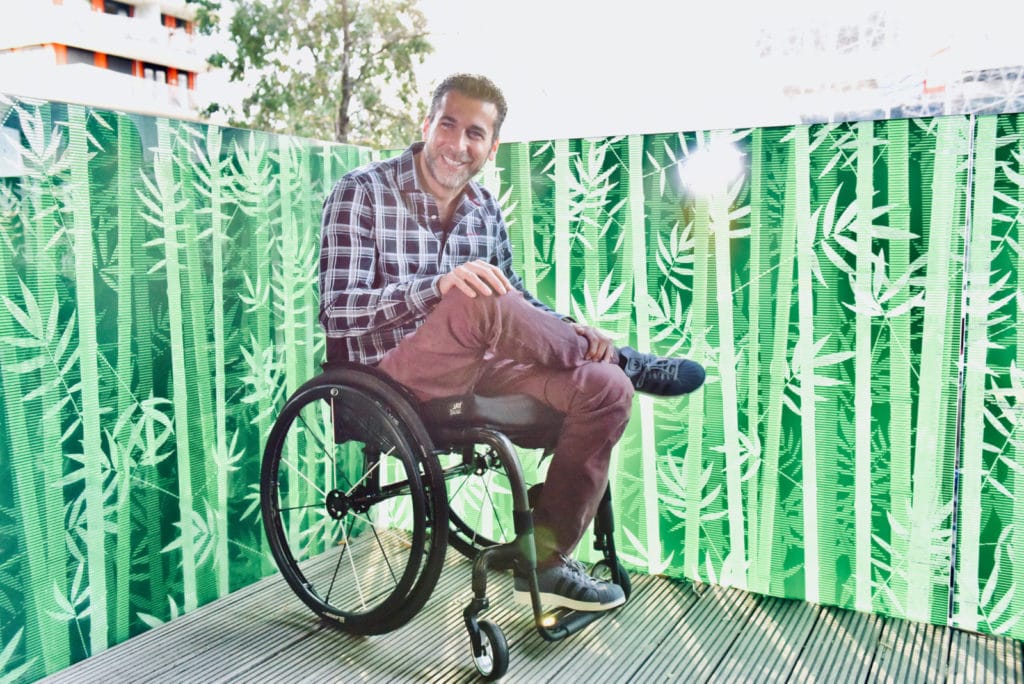
In het nu is het goed
‘Ruim een jaar geleden, in de week voor kerst, dezelfde week als waarin ik zestien jaar eerder een dwarslaesie kreeg, kreeg ik de diagnose blaaskanker. De tumor werd laat ontdekt en zat al helemaal door de blaaswand heen. Mijn blaas moest worden verwijderd en ik zou chemo krijgen. Dat leek me te overzien. Maar er werden helaas ook kankercellen gevonden in mijn lymfeklieren en de chemo sloeg niet aan.
Dat betekent dus dat de ziekte nog ergens in mijn lichaam zit en waarschijnlijk weer de kop zal opsteken. Van de mensen die dit hebben is na vijf jaar nog maar 35 procent in leven. Naar mijn persoonlijke prognose vraag ik niet. Zolang mijn situatie niet uitzichtloos is, blijf ik liever gedeeltelijk in ontkenning: op de dagen dat het voelt alsof ik niet ziek ben, wil ik kunnen doen alsof er niets aan de hand is. Waarom zou ik die laten verpesten door me zorgen te maken over iets waarop ik geen invloed heb?
Het afgelopen jaar was ik vaak ziek en moe van de infecties die in mijn lichaam rondwaarden. Op dit moment gaat het al een tijd redelijk goed. Mijn bloedwaarden zijn verbeterd en ook mentaal verbaast het me hoe goed het gaat. Het helpt dat ik tamelijk rationeel van aard ben. Bovendien hebben alle eerdere tegenslagen in mijn leven me geleerd er nuchter mee om te gaan. Ik besef heel goed dat ik het misschien niet red, maar kies ervoor om me te concentreren op het nu.
Een arts in het ziekenhuis zei aan het begin van het traject tegen me: ‘Hoe eet je een olifant? In kleine stukjes.’ Ik dwing mezelf om alleen maar naar het volgende kleine stukje van de olifant te kijken. Soms zie ik even die hele olifant voor me en ben ik bang dat ik het niet zal redden. Natuurlijk maakt die gedachte me verdrietig. Maar daarna richt ik mijn aandacht weer op het volgende wat gedaan moet worden.
Je hoort mensen in moeilijke situaties vaak zeggen dat er licht is aan het einde van de tunnel. Maar daar ga ik niet op wachten – ik hang liever zelf lampjes op ín de tunnel. Zo voelde ik vlak voor mijn eerste chemokuur dat mijn vriendin Remona en ik een feestje nodig hadden, iets om ons op te verheugen. Omdat ik weet dat het verstandiger is om niets meer uit te stellen, heb ik haar tijdens een optreden van Jochem Myer in Carré vanaf het podium ten huwelijk gevraagd, en afgelopen november zijn we getrouwd.
Natuurlijk hebben Remona en ik gesprekken gehad over wat er gebeurt als ik doodga en zij achterblijft met twee kleine kinderen, en hebben we ook veel gehuild. Maar we hebben er bewust voor gekozen te focussen op het nu en plannen te maken alsof er niks aan de hand is – afzeggen doen we wel als dat nodig blijkt. Mijn agenda staat dus vol activiteiten waar ik me op verheug. Voor mij is dat de beste manier om het vol te houden.’
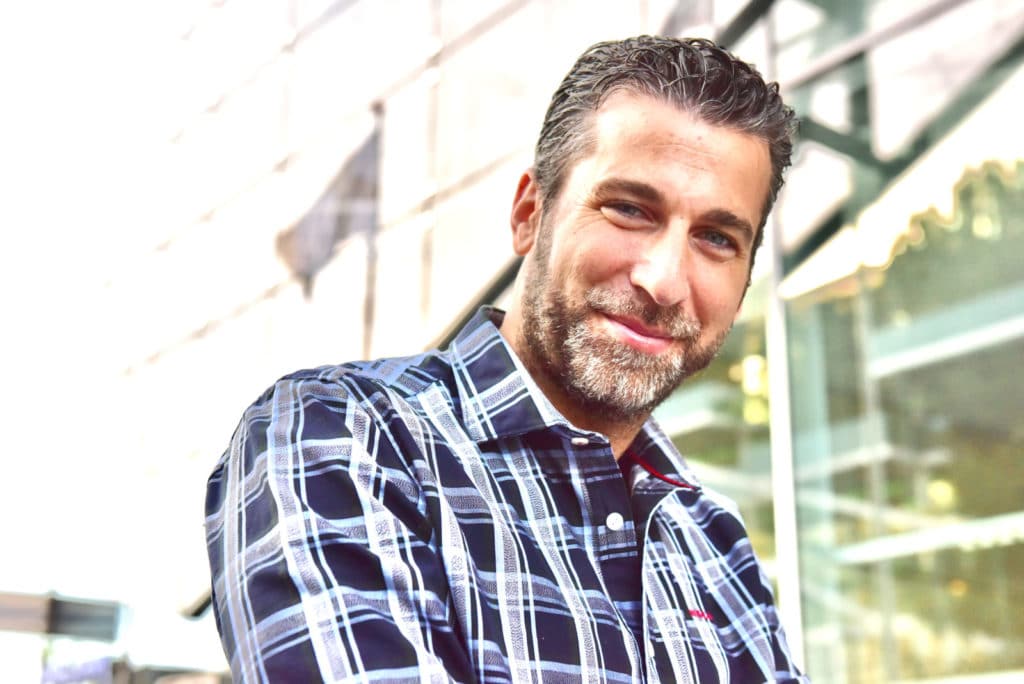
Nare omstandigheden kun je omarmen
‘Sinds 2002 heb ik een dwarslaesie. Over hoe dat is gebeurd, wil ik het niet meer hebben – als iemand het per se wil weten, moet hij maar even googelen. Belangrijker dan hoe het is gekomen, is hoe je met zo’n levensveranderende gebeurtenis omgaat. Dáár wil ik het over hebben.
Vroeger dacht ik dat het leven met zo’n handicap niet leuk meer zou zijn. De eerste vijf jaar was ik er daarom erg op gebrand weer te leren lopen: alleen dan zou ik weer gelukkig kunnen worden, dacht ik. Dat ik de rest van mijn leven in een rolstoel zou moeten doorbrengen, wilde ik niet accepteren.
Maar de revalidatie was moeizaam en zwaar. Het moment van inkeer kwam op een dag dat ik met veel worsteling 15 à 20 meter had afgelegd achter mijn rollator. Binnen tien seconden overbrugde ik in mijn rolstoel de afstand waar ik net lopend tien minuten over had gedaan. Ineens viel het kwartje: er zou nooit een moment komen waarop lopen beter ging dan me voortbewegen in een rolstoel. En ik besefte dat ik mét rolstoel eigenlijk alles kon: ik woonde zelfstandig en kon prima voor mezelf zorgen.
Het perspectief waarmee ik tot dan toe naar mezelf keek, was gebaseerd op het vooroordeel dat mensen in een rolstoel minder waard zijn dan mensen die kunnen lopen. Maar doordat er steeds meer moois in mijn leven kwam dat het directe gevolg was van mijn handicap, lukte het me langzaam om mijn situatie te accepteren en vervolgens werkelijk te omarmen.
Ik ging bijvoorbeeld op rolstoelbasketbal en schopte het tot het Nederlands team, waarmee ik de hele wereld over reisde. En met mijn handicap bleek ik ook nog gewoon met leuke meisjes te kunnen daten.
Ook had ik eindelijk een goed verhaal om het theater in te gaan, iets wat ik al langer wilde. Ik maakte een cabaretvoorstelling over mijn handicap en vertelde het publiek wat er allemaal cool aan was: dat het me met voetbal niet gelukt was om in Oranje te komen, maar met rolstoelbasketbal wel; dat ik in de Efteling niet in de rij hoef en overal gratis mag parkeren. Na een heleboel positieve kanten te hebben genoemd maakte ik dan de grap: “Ik weet wat jullie nu denken, jullie willen óók een dwarslaesie.” Daarmee hoopte ik anderen te laten zien dat je op een positieve manier tegen iets naars kunt leren aankijken. Want als ik iets heb ervaren, dan is het dat geluk niet afhankelijk is van je omstandigheden. Het is vooral het verhaal dat je jezelf vertelt, de blik waarmee je kijkt, die je werkelijkheid bepaalt.’
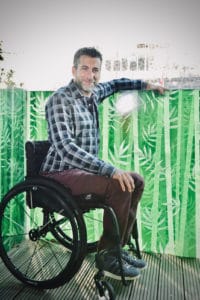
De liefde voor je kinderen moet voorop staan
‘De scheiding van mijn stiefmoeder en vader was een van de ingrijpendste gebeurtenissen in mijn leven. Ik was toen 12. Het begon vier jaar eerder al mis te gaan toen hun tweede zoon, Lion, al na elf maanden stierf door een hartafwijking. Door hun verdriet en het feit dat mijn vader veel in Amerika was voor zijn werk groeiden mijn ouders uit elkaar.
Vlak na de geboorte van mijn zusje zette mijn vader een punt achter de relatie, omdat hij zich ongelukkig voelde in hun huwelijk. Mijn moeder voelde zich gedumpt en was woedend omdat ze met een pasgeboren baby weer bij haar moeder moest gaan wonen. Ze kregen slaande ruzie, tot rechtszaken aan toe. Mijn broer Michel en ik woonden bij mijn vader, mijn halfbroertje en halfzusje bij mijn moeder, maar ineens stond er een muur tussen de twee families en mochten we ruim een jaar niet naar elkaar toe. Wij werden onderdeel van hun conflict en dat deed me veel pijn. Ik was al eens een moeder kwijtgeraakt, nu verloor ik ook mijn tweede moeder.
Ik probeerde een oplossing te vinden, maar het leek wel alsof ik met Israël en Palestina onderhandelde. Pas na zeven jaar bemiddelen kon het contact tussen mijn vader en mijn zusje enigszins worden hersteld. Ook daarna nog bleef het jarenlang met verjaardagen zo dat als de een kwam, de ander wegbleef. Wij kinderen moesten voortdurend kiezen of feestdagen apart vieren. Dat veranderde pas toen mijn broertje als eerste kinderen kreeg en tegen onze ouders zei: “Jullie zijn alleen opa of oma van mijn kinderen als je op hun verjaardagen komt, en dan gedraag je je normaal tegen elkaar.”
De scheiding en de nasleep ervan hebben een grote invloed op me gehad. Ik was erg teleurgesteld in mijn ouders: hun haat jegens elkaar was blijkbaar groter dan hun liefde voor ons, want ze waren niet in staat om omwille van ons aan hun woede te ontstijgen. Op mijn 17e ging ik het huis uit. Dat ik niet meer tussen twee vuren zat, gaf rust.
Doordat ik bang was geworden me aan iemand te hechten, duurden mijn relaties nooit langer dan een paar maanden. Ik wist hoe pijnlijk het kan zijn als liefde verkeerd gaat, dus ik liet verliefdheid nooit liefde worden – dat vond ik te eng.
Sinds ik met Remona samen ben, voelt het alsof het vanzelf gaat, en ik moet er niet aan denken dat het fout loopt tussen ons. Maar één ding weet ik heel zeker: mocht dat gebeuren, dan zal ik koste wat kost ervoor zorgen dat we niet in dezelfde situatie terechtkomen als mijn ouders, door begrip op te brengen voor de emoties van de ander en een brug te slaan. De liefde voor mijn kinderen en de wens het voor hen zo goed mogelijk te doen, zal voor mij altijd voorop blijven staan.’
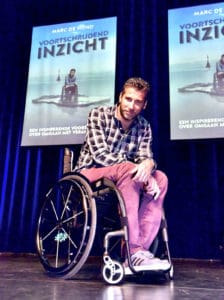
Alles is tijdelijk, maar dat is niet erg
‘Als twintiger ben ik een paar maanden multimiljonair geweest. Ik had met twee compagnons Veiling.com, de grootste internetveiling van Nederland. Alle grote Europese concurrenten wilden ons bedrijf overnemen. Omdat we allemaal een flink aandeel hadden, waren we na de overname op papier miljonair. We mochten niet direct alles verkopen, want dan zou de koers kelderen, maar ik verkocht zoveel als was toegestaan en kreeg als 22-jarige toch maar mooi een paar ton op mijn rekening. Ik kocht een sportauto en betaalde mijn hypotheek af.
Maar toen barstte de internetbubbel. Tegen de tijd dat we onze aandelen wél mochten verkopen, waren ze niet veel meer waard.
Ik was al vaker op de radio geweest om te vertellen over internet en werd gevraagd om dj te worden bij 3FM. Ik mocht ’s nachts en in het weekend mijn eigen programma maken. Maar de droom om de nieuwe Ruud de Wild te worden ging in rook op toen ik die dwarslaesie kreeg – vijf dagen per week van zes tot negen een ochtendprogramma presenteren, is ondoenlijk.
Het is heel pijnlijk dat ik veel dingen die ik leuk vind en goed kan, misloop door al mijn fysieke ongemakken. Ik moet mijn carrière er altijd maar een beetje bij doen en kan daardoor slechts beperkt succes boeken, want mijn eerste baan is mantelzorger van mezelf zijn en daar gaat veel tijd in zitten. Zo heb ik geleerd dat alles tijdelijk is en voorbijgaat. Maar daar zit ook een positieve kant aan: steeds weer dient zich iets nieuws aan wat de moeite waard is. Het is mooi dat het leven zoveel verschillende fasen kent. Daardoor kunnen in één leven verschillende dromen uitkomen.’
Marc de Hond (1977) was presentator en theatermaker. Hij begon op zijn 18e als succesvol internetondernemer. In 2002 raakte hij gedeeltelijk verlamd. Over de revalidatieperiode en de acceptatie van zijn dwarslaesie publiceerde hij in 2008 het boek Kracht. Hij werkte als dj voor 3FM en presenteerde diverse programma’s op televisie, waaronder De rekenkamer (2012-2014). Ook versloeg hij de Paralympische Spelen voor de NOS. Hij maakte de cabaretvoorstellingen Scherven brengen geluk (2014) en Wie bang is krijgt ook klappen (2016). Tot corona de boel in de war stuurde, stond Marc de Hond in het theater met Voortschrijdend inzicht, een voorstelling voor zijn kinderen en nabestaanden. Hij is getrouwd met voormalig atlete Remona Fransen; samen hebben ze twee kinderen. Marc de Hond overleed op 3 juni 2020.
